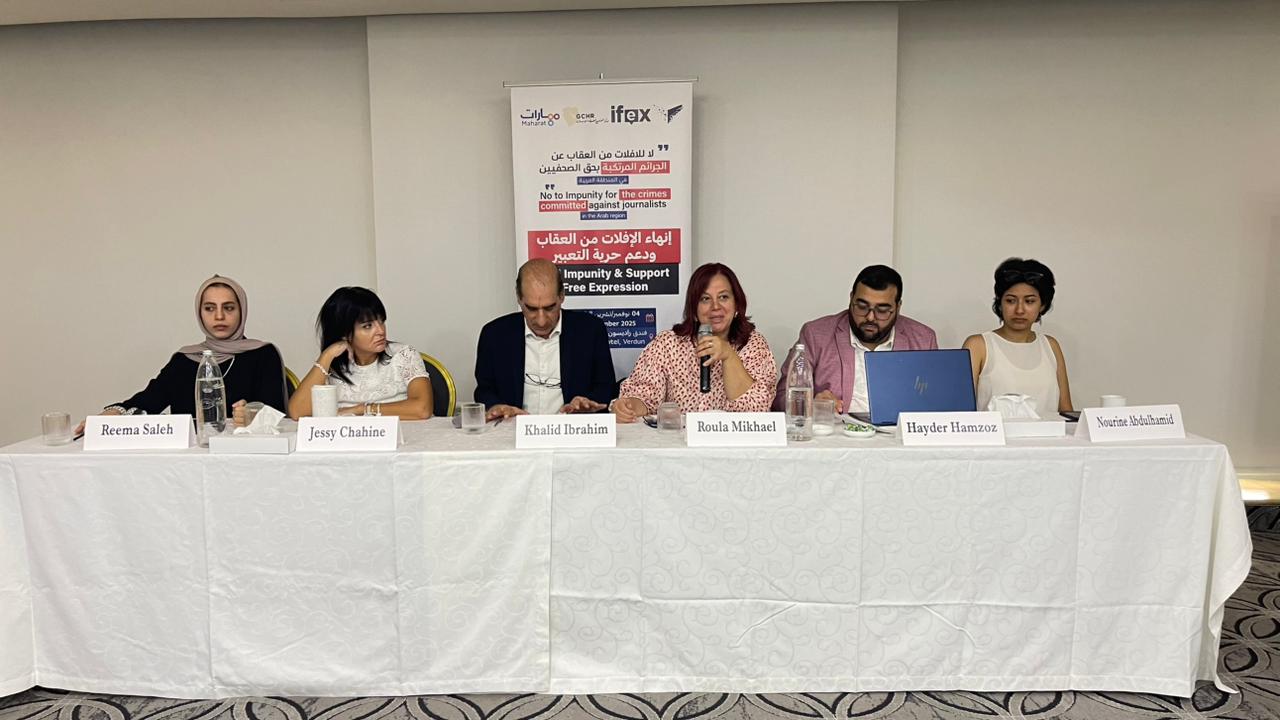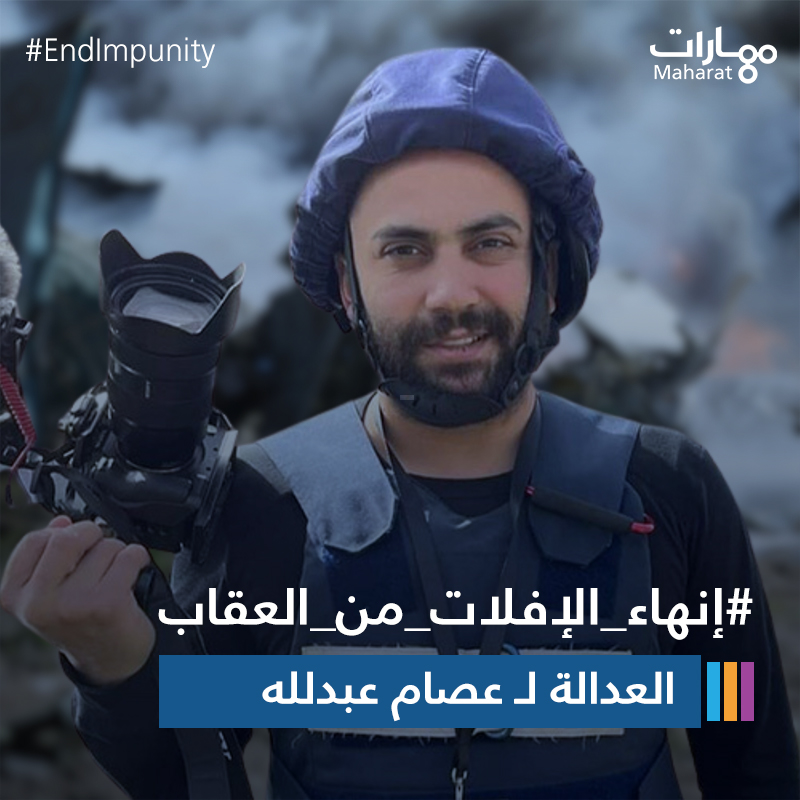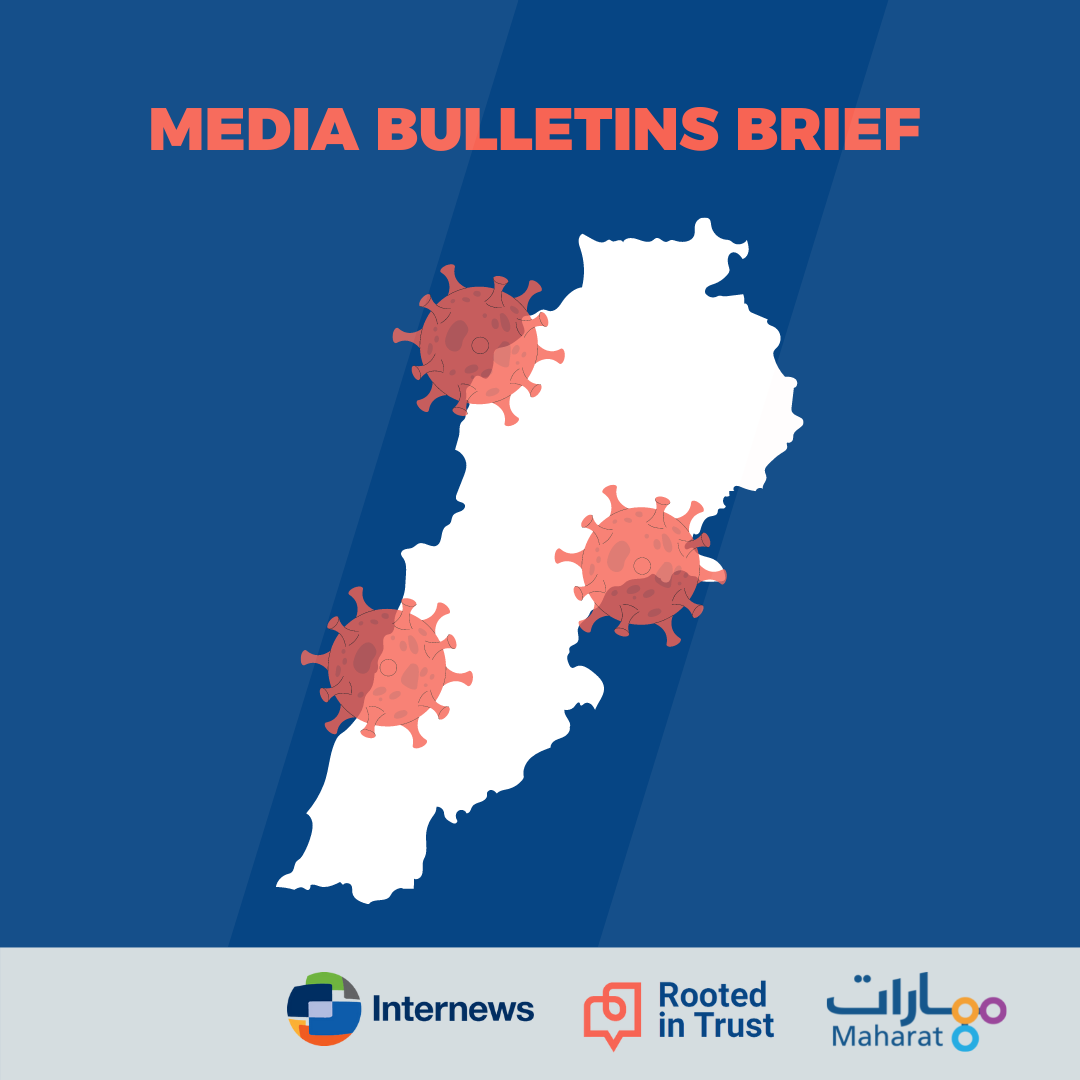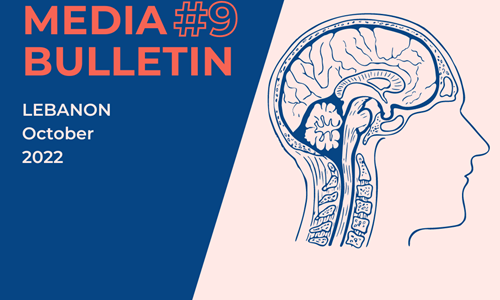
Joint Event “No Impunity for Crimes Against Journalists in the Arab Region”
To mark the 12th anniversary of the International Day to End Impunity for Crimes Against Journalists, observed on 02 November 2025, a group of local, regional, and international human rights groups organised an event entitled, “No Impunity for Crimes Against Journalists in the Arab Region,” on 04 November 2025, in Beirut.
The event included a seminar moderated by Khalid Ibrahim, Executive Director of the Gulf Centre for Human Rights (GCHR), with the participation of Roula Mikhael, Executive Director of Maharat Foundation, Hayder Hamzoz, Executive Director of the Iraqi Network for Social Media (INSM), Jessy Chahine, Media Officer at the Regional Office of the High Commissioner for Human Rights (OHCHR), Reema Saleh, a human rights researcher from Palestine, and Nourine Abdulhamid, a journalist from Egypt.
The event also included a Q&A session with journalists and a photo exhibition featuring images of journalists who were killed due to their professional work in the Middle East and North Africa region in recent years up to 2025. A joint report was also launched on this occasion and can be read here.
Khalid Ibrahim, Executive Director of GCHR, presented an overview of the impunity situation for crimes committed against journalists in the Arab region. He stated that on this International Day to End Impunity, they will exert every effort to support journalists, ensure their safety, protect press freedom, and end impunity. He also urged all governments in the region to work diligently to amend all laws that restrict freedom of expression online and offline.
In the same context, Roula Mikhael, Executive Director of Maharat Foundation, pointed out that journalists in Lebanon and the region have been paying a heavy price for decades simply for practicing their profession. In Lebanon, none of the crimes committed against journalists have led to the perpetrators being brought to justice, thus entrenching a culture of impunity. With the recent Israeli war on Lebanon, attacks and targeting have intensified, and a number of journalists have been killed while performing their duties, in a scene that reaffirms that the lives of journalists remain threatened and without effective protection.
Mikhael also said, "This reality cannot be separated from the broader picture in the region, where our discussions with journalists from various countries in the Middle East and North Africa have shown that wars and conflicts have weakened independent media and narrowed the space for freedom of expression. If we want journalists to be able to expose corruption and hold those in power accountable, we need a legal system that guarantees their protection and judicial mechanisms that deal seriously with violations against them, so that journalists feel protected by law and in practice."
Jessy Chahine, Media Officer at the Regional Office of the High Commissioner for Human Rights (OHCHR), stressed that the safety of journalists is a fundamental pillar for ensuring freedom of opinion and expression and promoting transparency and accountability in societies. She also pointed out that attacks on journalists are not merely violations of their individual rights, but also threaten the collective right of society to access information. For this reason, the United Nations and international and regional organisations have given increasing importance to this issue and have adopted standards and action plans aimed at protecting journalists and combating impunity.
Chahin emphasised that enhancing the safety of journalists requires a comprehensive approach that combines governmental commitments, UN support, and civil and professional initiatives. Protecting journalists is not only a moral imperative, but also a prerequisite for strengthening democracy, the rule of law, and guaranteeing the right to know for all.
In this context, Hayder Hamzouz, Executive Director of the Iraqi Network for Community Media (INSM), said, "Ending impunity is not only about achieving justice for victims, but also aims to restore trust, protect the right to know, and ensure that no voice is silenced by fear."
Palestinian human rights researcher Rima Saleh said, "On this day dedicated to ending impunity for crimes against journalists, I speak to you as a daughter of Gaza, from a place where conveying the truth has become a crime against my colleagues, brothers, and friends in the press in Gaza. My fellow journalists were not killed by chance, but by direct targeting. They were killed by bullets from the Israeli occupation army because they insisted on showing the world the genocide we are experiencing in Palestine, like Ahmed Abu Aziz and Rushdi Al-Sarraj, who were killed because their cameras were documenting the crime. Ending impunity is not only a defense of them, but of our collective right to have the truth told without fear."
Similarly, Egyptian journalist Nourine Abdulhamid pointed out that "we need to rebuild journalism from its very foundations. It needs to be based on principles that protect it from corruption before it condemns the corruption of others. We must re-establish the profession as if we are starting from scratch, because the same person who escaped punishment when suppressing an opinion is the same one who imprisoned a journalist yesterday, and the same one who killed him today."
It is worth noting that the United Nations General Assembly, at its 68th session in 2013, adopted resolution 68/163, declaring 02 November as the International Day to End Impunity for Crimes against Journalists. The resolution urged Member States to implement specific measures to combat the prevailing culture of impunity. This date was chosen to commemorate the assassination of two French journalists in Mali on 02 November 2013.
This complements the UN Plan of Action on the Safety of Journalists and the Issue of Impunity, adopted by the UN System Chief Executives Board for Coordination on 12 April 2012. The plan called upon UN agencies, funds, and programmes to work with Member States to create a free and safe environment for journalists and media workers in conflict and non-conflict situations, with the aim of promoting peace, democracy, and development worldwide.





